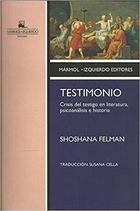What is the meaning of this growing predominance of testimony as a privileged way in the contemporaneity of transmission and communication? Why has testimony at the same time become so central and so ubiquitous in our last accounts of ourselves?
What, however, is at stake in the broader, deeper and least definable crisis of truth? What testimony does not offer is, however, a complete affirmation, a totalizing account of these facts. In testimony, the language is in process and prosecuted, it does not appear as a conclusion, such as the finding of a verdict or the self-transparency of knowledge. Testimony is, in other words, a discursive practice, as opposed to a pure theory. To testify - to swear, narrate, promise, and produce one's own discourse as material proof for the truth - is to perform an act of speech, without simply making an assertion. As an act of performative speech...read more
All book titles by this author
|
Title |
Price | ||
|---|---|---|---|
|
|
Testimonio Author: Shoshana Felman Publisher: Marmol izquierdo |
$490.00
15%$416.50 |
Shopping cart
Loading cart
Important notices
|
|
Recordando a André Rouillé: Su legado en la fotografía André Rouillé 1948 - 2025 |
|
|
Libros de filosofía y co. Disponibles en Librería Herder |
|
|
Revista Filosofía & Co. nº 9 Nueva revista de filosofia divulgativa y actualidad |
|
|
"Espacios de la filosofía" - Mauricio Beuchot - Novedad Herder México |
|
|
Revista Filosofía & Co. nº 8 Nueva revista de filosofia divulgativa y actualidad |
Pay safely with:


In the webshop
New
|
|
Medios calientes 70159 $400.00 -0.00% $400.00 |
|
|
El bestiario de Michel Foucault 70404 $749.00 -15.00% $636.65 |
|
|
Regresar afuera 70148 $275.00 -0.00% $275.00 |
|
|
La instauración filosófica 70142 $570.00 -20.00% $456.00 |
|
|
La fuerza de los fuertes 70405 $519.00 -15.00% $441.15 |
In the press
Promotions
|
|
El Gobierno de las emociones 65449 $965.00 -60.00% $386.00 |
|
|
Prosa y poesía. Homenaje a Gonzalo Sobeja 70242 $1,755.00 -25.00% $1,316.25 |
|
|
Lingüística española aplicada a la terapia del lenguaje 70239 $300.00 -25.00% $225.00 |
|
|
Introducción a la filosofía 70243 $620.00 -25.00% $465.00 |
|
|
El tratamiento de los niños autistas 70240 $675.00 -25.00% $506.25 |








